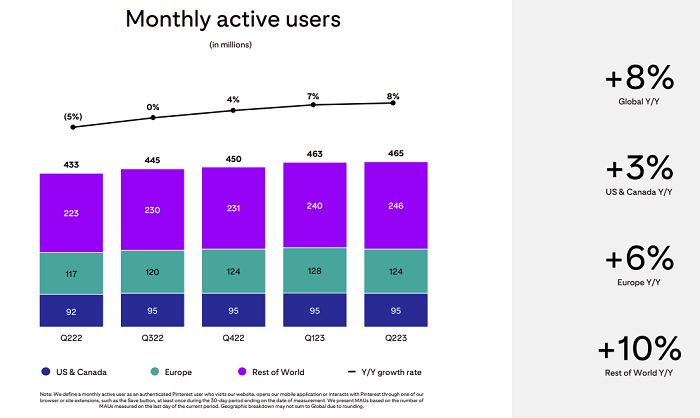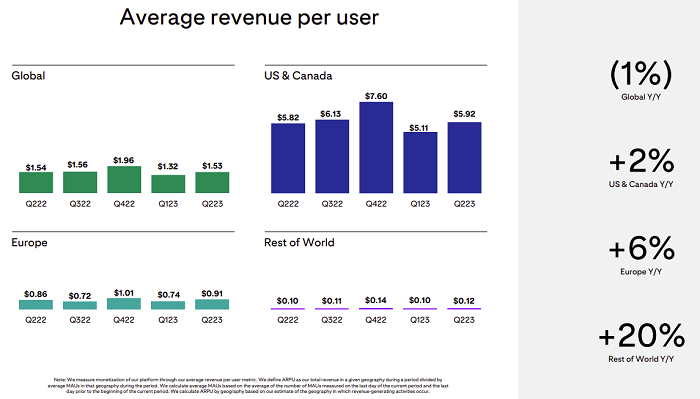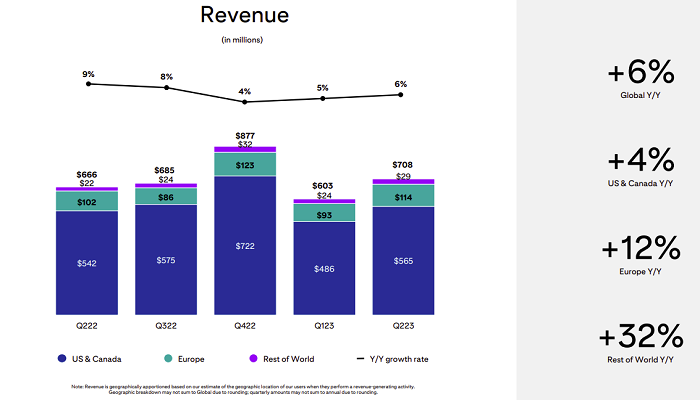Pinterest has published its Q2 2023 performance update, which shows some concerning signs for overall platform growth, though it is growing, which is a positive trend.
First off, on users. Pinterest added 2 million more users in Q2, taking it to 465 million monthly actives.

That’s Pinterest’s slowest growth rate in a year, though again, it is growing, which in itself is welcome news after the platform suffered a decline in usage following the pandemic bump.
In Q1 2021, at the height of the COVID lockdowns, when everyone was seeking alternative shopping options, Pinterest rose to 478 million users, before sliding back over the next year to 431 million. Since then, it’s been steadily regaining its footing, so while its growth has slowed in this quarter, it is maintaining an upward trajectory, though slower growth will logically spook the market.
What’s particularly concerning in this respect, however, is that Pinterest is actually losing ground in its most lucrative user markets. U.S. growth has stagnated, while European usage declined, with all of its new users coming from the ‘Rest of the World’ category.
Which just doesn’t generate as much revenue for the app.

Pinterest is clearly reliant on the North American market, and while global expansion will facilitate new opportunities, as you can see in these charts, the revenue impact of such pales in comparison to its key centers.
The fact that EU users are seemingly losing interest is a concerning sign, while Pinterest needs to see at least some growth in the US to boost its revenue potential. It hasn’t increased its US user count for essentially a year now, and that’s something that’ll come under more scrutiny as analysts look to project the app’s future potential.
But right now at least, Pinterest is maintaining revenue growth, posting a 6% year-over-year increase to $705 million for the period.

It’s steady, and it’s not going to blow anybody away. But along with cost-reduction measures, Pinterest is maintaining its margins, and growing its business opportunities, which will see it hold firm for now amid shifting market conditions.
In terms of usage, Pinterest says that sessions, impressions, and Pin saves all grew faster than MAUs, which it claims is indicative of it ‘deepening engagement with our user base’. In other words, while Pinterest may not be adding a heap of new users, those that are using the app are engaging for longer, and more often, so it’s in a better position to monetize its most engaged audience.
Though again, you would want more of these users to be in the U.S. and EU, but 465 million engaged shoppers is still a very valuable audience, which many retailers, in particular, will be interested in.
Pinterest also notes that it’s seeing solid growth in usage among younger audiences:
“In Q2, Gen Z were our largest contributor to overall engagement growth and the fastest growing cohort, growing double digits and accounting for a larger portion of our overall mix.”
That’s also a good indicator for future success, but a lot of this is projecting forward, with the immediate results reflecting more of a holding pattern for the app.
Pinterest also says that it’s seeing engagement growth in various key verticals, including men’s fashion, autos, health, and travel, again highlighting expanded opportunity.
Auto marketing has emerged as a bigger focus for the app, in a niche that many wouldn’t expect, and it’s worth highlighting in this context, as Pinterest does see a lot of engagement in several verticals that are outside of its normal DTC focus.
So what do these results suggest for marketers?
Pinterest remains a potentially valuable consideration for a wide range of brands, and really, you need to explore the app for yourself to understand your opportunities, and how brands in your niche are performing.
465 million users is a big audience, with a wide range of interests, and you can use tools like Pinterest Trends to get a handle on what people are engaging with, and how that relates to your business.
It’s not exploding with new users, and some of the growth numbers here are a concern. But with such a big group of users coming to the app with shopping intent, there are still significant opportunities for the right brands.



